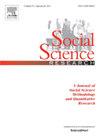State-level contexts and sexual minority occupational segregation in the United States: Assessing legal protections and public attitudes
IF 3.5
2区 社会学
Q1 SOCIOLOGY
引用次数: 0
Abstract
Using data from the 2015–2019 American Community Survey, this study examines occupational segregation—specifically intergroup differences in occupation-level gender composition, earnings, and prestige—between heterosexual and sexual minority workers in the United States, focusing on workers in same-sex marriages (SSM) compared to those in different-sex marriages (DSM). The study also investigates the role of state-level contexts, such as anti-discrimination laws and public attitudes toward homosexuality, in moderating occupational segregation. Findings indicate significant patterns of segregation: SSM men are more likely to work in female-dominated, lower-paying, lower-prestige occupations, while SSM women tend to work in male-dominated, higher-paying, lower-prestige occupations compared to their heterosexual counterparts. State-level legal protections and supportive cultural attitudes toward sexual minorities are associated with reduced segregation, particularly in gender composition and prestige for both men and women. This research contributes to understanding the occupational experiences of sexual minorities and underscores the importance of legal and cultural factors in shaping their career outcomes.
美国的州级背景和性少数群体职业隔离:评估法律保护和公众态度
本研究利用2015-2019年美国社区调查的数据,研究了美国异性恋和性少数群体工人之间的职业隔离——特别是职业层面性别构成、收入和声望方面的群体间差异,重点研究了同性婚姻(SSM)工人与异性婚姻(DSM)工人之间的比较。该研究还调查了国家层面的环境,如反歧视法和公众对同性恋的态度,在缓和职业隔离方面的作用。研究结果表明了显著的隔离模式:与异性恋者相比,SSM男性更有可能在女性主导、低收入、低声望的职业中工作,而SSM女性则倾向于在男性主导、高收入、低声望的职业中工作。国家一级的法律保护和对性少数群体的支持性文化态度与减少隔离有关,特别是在性别构成和男女声望方面。这项研究有助于理解性少数群体的职业经历,并强调了法律和文化因素在塑造其职业成果方面的重要性。
本文章由计算机程序翻译,如有差异,请以英文原文为准。
求助全文
约1分钟内获得全文
求助全文
来源期刊

Social Science Research
SOCIOLOGY-
CiteScore
4.30
自引率
4.00%
发文量
0
审稿时长
65 days
期刊介绍:
Social Science Research publishes papers devoted to quantitative social science research and methodology. The journal features articles that illustrate the use of quantitative methods in the empirical solution of substantive problems, and emphasizes those concerned with issues or methods that cut across traditional disciplinary lines. Special attention is given to methods that have been used by only one particular social science discipline, but that may have application to a broader range of areas.
 求助内容:
求助内容: 应助结果提醒方式:
应助结果提醒方式:


